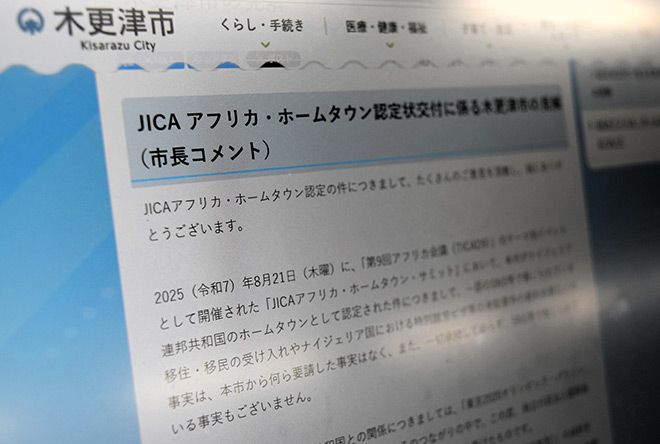Misinformation about a project aimed at promoting friendship between Japan and Africa sparked a wave of online protests concerning an expected “flood of immigrants” and prompted the Foreign Ministry to take action.
The Japanese side said erroneous media reports in some of the participating African nations, as well as mistranslations, likely led to bogus information that spread rapidly on social media.
Japanese officials and organizations involved, including the Japan International Cooperation Agency (JICA), scrambled to issue denials that immigration plays any part of the friendship project.
But the information was so erroneous and had spread so widely that the Foreign Ministry got involved.
JAPAN-AFRICA PARTNERS
The brouhaha stems from the Ninth Tokyo International Conference on African Development (TICAD 9) held in Yokohama between Aug. 20 and 22.
On Aug. 21 at the conference, JICA announced that it has designated four Japanese cities as a symbolic “JICA Africa Hometown” for four partner countries in Africa.
The project pairs local governments in Japan and African governments. JICA supports these partnerships with personnel exchanges and collaborative events to promote international exchanges.
The announced pairs are: Imabari in Ehime Prefecture with Mozambique; Kisarazu in Chiba Prefecture with Nigeria; Sanjo in Niigata Prefecture with Ghana; and Nagai in Yamagata Prefecture with Tanzania.
According to JICA’s website, the project “aims to further strengthen the relationships that each municipality has built with African countries, contributing both to addressing challenges in Africa and revitalizing local communities in Japan.”
However, after the announcement, protest posts appeared on social media over the false notion that the exchange program was aimed at bringing Africans to Japan to work.
“Without any permission from the citizens, (cities) suddenly become the ‘official hometown’ for Africa,” one post said.
A common question asked on social media posts was, “If immigrants come flooding in, who is going to take responsibility?”
In response, JICA on Aug. 25 posted a statement on its website, titled, “Correction Regarding Media Coverage on ‘JICA Africa Hometown.’”
It said several African media and one African government published reports containing inaccurate information and misleading language about the project.
JICA stated that reports suggesting that the project would promote acceptance of African immigrants or provide special visas to them “are all factually incorrect.”
Mayors of all four cities also issued statements.
Kisarazu Mayor Yoshikuni Watanabe explained in a statement posted on the city government’s official website on Aug. 26 that Kisarazu served as a host town for Nigeria for the 2020 Tokyo Olympic and Paralympic Games.
JICA’s designation is based on that connection and “this is not an initiative that leads to accepting migrants or immigrants,” the mayor said.
Sanjo Mayor Ryo Takizawa said in a statement, “It is not true that the city has requested to accept migrants or immigrants from Ghana, and the city has no plans to make such a request in the future.”
He also addressed reports on social media and other platforms that rules for special work visas will be relaxed for Africans.
“But this information is not true,” he said.
Nagai Mayor Shigeharu Uchiya acknowledged in a statement that the city had received a large number of opinions regarding the issue of international exchange.
“There is absolutely no truth to what is being reported on some social media and other platforms, such as claims that our city will become a part of Tanzania or that we will actively accept immigrants,” the statement said.
The claims may come from people who read an article in The Tanzania Times with the headline, “Japan dedicates Nagai city to Tanzania.”
“Dedicates” was apparently translated on social media into the Japanese word “sasageru,” meaning the city was being “offered up” or “sacrificed” to Tanzania.
“I find it very regrettable that information is spreading in a way that is contrary to the facts,” the mayor added.
Imabari Mayor Shigeki Tokunaga released a statement on Aug. 26, saying, “There is absolutely no truth to claims that Japanese territory or the authority of a local government will be transferred.”
The mayor also urged people not to be “misled by baseless information or information based on factual errors,” and called on them to refrain from posting or spreading it.
REQUEST FOR CORRECTION
The developments prompted the Japanese government to step in.
On Aug. 26, the Foreign Ministry announced that it had requested the Nigerian government to correct the false information that it had been spreading, including Japanese plans to issue new visas.
The Nigerian government posted a news release on Aug. 22 that said the Japanese government named Kisarazu as “the hometown for Nigerians willing to live and work in the country as part of its strategic efforts to deepen cultural diplomacy, promote economic growth and enhance workforce productivity.”
The news release said that under the new partnership, the Japanese government “will create a special visa category for highly skilled, innovative and talented young Nigerians who want to move to Kisarazu to live and work.”
“Artisans and other blue-collar workers from Nigeria who are ready to upskill will also benefit from the special dispensation visa to work in Japan,” the news release said.
A Foreign Ministry official said JICA has reported to the ministry that it told Nigeria that the goal of the initiative is to “strengthen exchanges with the hometown”–and it made absolutely no mention of “issuing special visas.”
The ministry said that through the Japanese Embassy in Nigeria it has requested a correction and explained the actual details of the project.


AloJapan.com